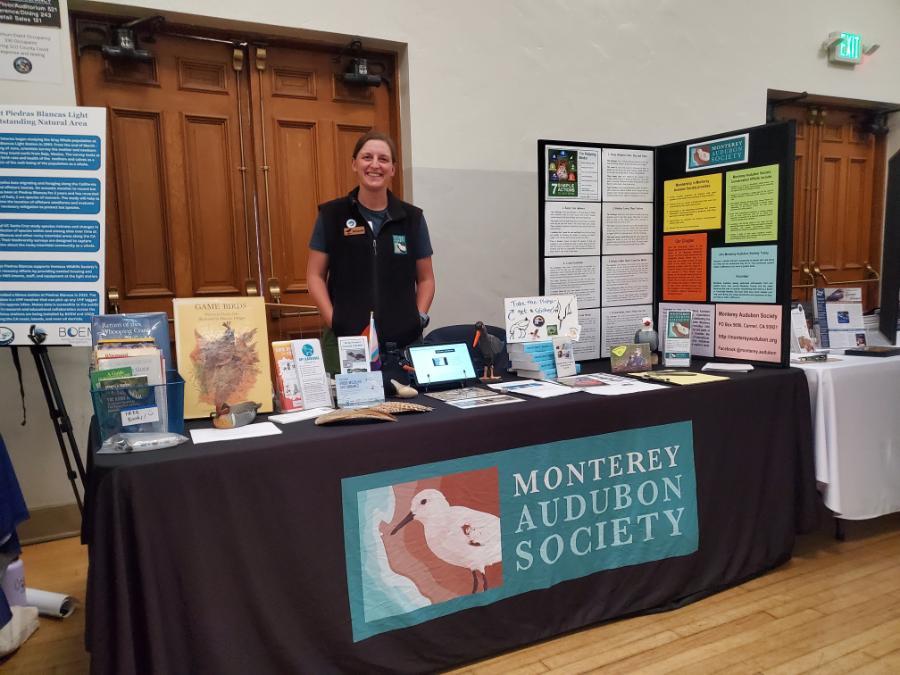Environmental Science MS
BIO and AES Alumna’s Career Takes Wing

Amanda Preece, an alumna of both the Biology and Environmental Science MS program, now works as the Environmental Advocate with the Monterey Audubon Society. She will be our seminar speaker on March 18, 2024. The seminar will be in Chapman E104 at 4 pm.
We touched base with Amanda to learn more about her work and how her experiences at CSUMB helped shape her career pathway. Check out her interview below!
What was your major?
Biology (undergraduate), 2015. Master's of Science, Environmental Science from CSUMB, 2020
What is your current position? Please provide background information on your job title, duties, and workplace.
Title: Environmental Advocate with the Monterey Audubon Society (MAS). Duties include coordinating multiple bird conservation projects related to monitoring local species of concern, plus leading field trips, writing grants, managing volunteers, submitting public comment, plus numerous other administrative tasks that go with managing a nonprofit. I'm the first and only staff person MAS has ever had! I feel a huge responsibility to not only do good conservation work, but to establish best practices for managing the organization. Our chapter region encompasses all of Monterey County, plus a bit of west San Benito County and south Santa Cruz County. So far, most of our conservation work occurs in the Monterey area, where most of our members reside. We are working to expand our impact to other at-risk habitats (grasslands and riparian) plus inviting and engaging with birders and conservation partners throughout the chapter area. One of my main goals is to get more people excited about birds and see how they can become nature advocates themselves, in many different ways.
How did your experience as a CSUMB science student contribute to your current career pathway? Please explain.
I had always operated at the individual animal-level, having been a zookeeper and working in wildlife rehabilitation for many years, even throughout my undergraduate education. That's why it took me so long to finish my undergraduate degree! It was such fulfilling work. And the work of animal care staff at zoos, aquaria, and wildlife rehabilitation facilities is 100% essential and I love and respect the people in those fields. But once I began taking classes for my graduate program, I gained the skills, confidence, and ultimately the desire to make a positive impact at a larger scale. Given the challenges our fellow creatures face (animal and human alike), I felt like I had to begin working at a broader level. And I still volunteer in the animal care field to get a little boost from being in close contact with the amazing creatures that live on this planet with us. They motivate me to keep going. I mean have you looked into the eyes of a Double-crested Cormorant recently? Binoculars will keep you at a safe distance, but that's definitely a dinosaur looking back at you. Just mind-blowing!
What was your favorite course /courses in the program and why?
Landscape Ecology (ENVS 446/546) with Dr. Jenny Duggan (who was also my thesis advisor) was such an excellent class to look at landscape-level impacts to the wildlife that I'd been focused on. It's like taking a step back to see how larger effects are impacting the birds in my backyard. I also regularly use skills I learned in Remote Sensing and Image Processing (ENVS 436/536) taught by Dr. Fred Watson. ArcGIS and general GIS/GPS skills are essential when doing anything that looks at how the land is used, surveyed, or assessed by either cities, counties, or wildlife. It's a great way to share and visualize information.
Are there any specific professional/technical skills that you gained while at CSUMB that have helped contribute to your current success?
Writing technical papers and GIS/GPS skills have all been essential in my current work. Additionally, the skills I learned for managing a research team on a tight timeline has been helpful in coordinating multiple projects and keeping track of filing dates and calendars.
Have you had any recent accomplishments that you would like to share with us? (publications, awards, etc.)
We were awarded grant money from Monterey County Fish and Game Advisory Commission to purchase equipment for a Motus station at the Fort Ord Natural Reserve. Motus is a newer tracking technology that allows researchers to put lightweight tags on small songbirds, bats, and even butterflies to track their movements. The more antennae that are in the network, the more robust the data will be! There is only one Motus station in Monterey County so far and ours will be the second.
Is there anything else you would like to share with us about your experience in our program? We value you as an alumna/us!
I really appreciated the applied aspects of the Master's Program. Participating in class projects with community partners set up many of my classmates for excellent jobs immediately after graduating. And I feel like the information I learned about existing problems our local community are facing has helped me become a more active citizen. I feel more comfortable reading agendas, technical reports, and engaging in politics. It was very empowering!
Congratulations on all of your success, Amanda! We’re otterly proud of you!